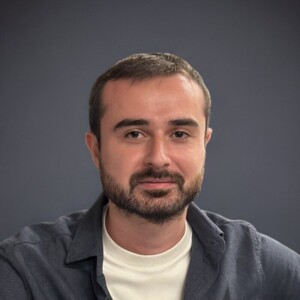Overview
Acting as CCG’s primary in-depth capacity building offer, the Bootcamps aim to support academics, international organisations, and governments in producing specific outputs, whilst building sustainable and enduring capacity. The Bootcamps combine many of CCG’s offers, including the OpenLearn Collection (OU), the Energy Modelling Platforms (EMP), and the Energy Modelling Community (EMC), creating capacity building options that are specifically tailored to the profile of the applicant. For a precise description of the CCG Bootcamps, please watch the following video.
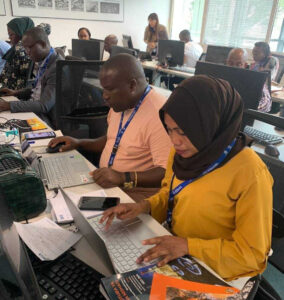
Key elements of the Bootcamps involve:
- Bootcamps are typically undertaken by teams of people working together rather than by individuals.
- Bootcamps are undertaken with the objective of delivering a specific product, which could be a research paper, a policy document, or a course curriculum.
- Bootcamps benefits from a CCG coach, who supports the team before, during, and after the training until they have successfully delivered the end product.
To initiate a Bootcamp, the team typically applies directly to the Energy Modelling Platform (EMP) under their selected Bootcamp
THERE ARE FOUR TYPES OF BOOTCAMP, EACH CORRESPONDING TO A SPECIFIC AUDIENCE. CLICK BELOW FOR MORE INFORMATION.
Scholars’ Bootcamp (SBC)
Aimed at academics (alumni/new participants), wishing to produce a research paper
The Scholars’ Bootcamp, aimed at academics (alumni or new) envisions a 6 to 12 month engagement, at the end of which the team produces a research paper, submitting it for peer-reviewed publication.
Attendance to the Scholars’ Bootcamp must be in a team, individual attendance is not permitted. The team can have 2 members and more, with a maximum team size of 8 members.
The research paper that the team produces MUST use at least 2 of the following tools:
- OSeMOSYS
- MAED
- FINPLAN
- OnSSET
- CLEWs
The two or more tools, along with their analysis, MUST be connected using the Data-to-Deal Analytical Workflow (see diagram below). For more information on the workflow, please read the following paper. The final paper thus must be a modelling based paper, in which at least 2 tools are used and concrete modelling results are presented (the paper may include policy analysis, as well as other analysis deemed of importance).
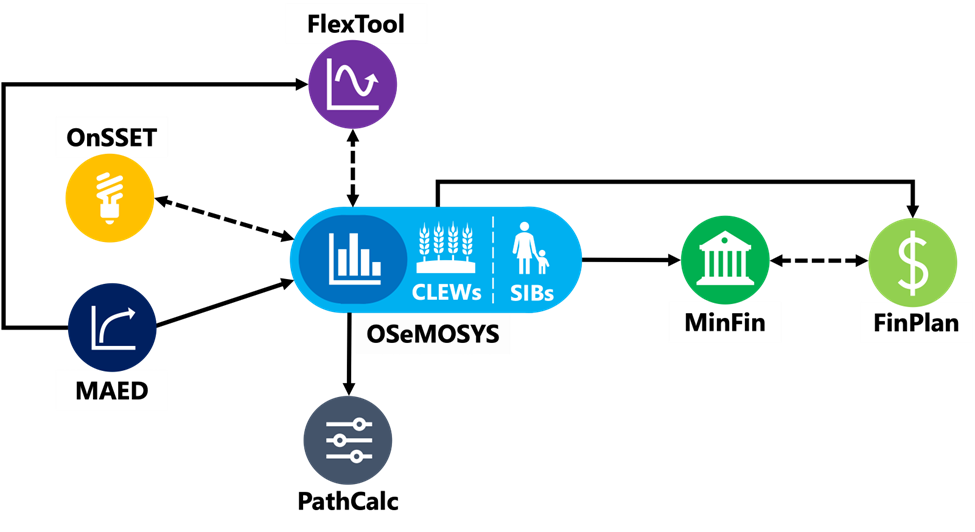
The Scholars’ Bootcamp supports the production of the paper by:
- Assigning the selected team a coach, who works with the team in managing the research process, guiding the modelling and research development, and supporting the team in writing the paper,
- Having the team participate in 2 EMP events:
- If the team has been trained in the tools already, participation in the event is for the purposes of developing the model,
- If the team has not been trained in the tools already, participation in the event is for the purposes of learning how to use the tools for effective modelling,
- The coach travelling to the team to support modelling, paper development and other elements,
- The team attending a final write up session, to complete and submit the paper.
The below diagram displays the chronological timeline for conducting the Scholars’ Bootcamp.

Apply to the Scholars’ Bootcamp
In applying to the Scholars’ Bootcamp, it is assumed that:
- you are applying for two EMP events (eg EMP-A and EMP-G),
- you are applying for more than one tool,
- you are applying as a team (more than one individual),
- you will be connecting at least two tools from the D2D-AW,
- you have a clear research aim, that displays how you intend to connect the two tools, what your analysis will be about, and what you hope you achieve in the research paper,
- you and your team are able to devote time to work on your model and paper for a period of 6-12 months,
In order to be considered eligible for the Scholars’ Bootcamp, you must qualify for all of the assumptions stated above.
There is no fee to attend. However, competition for space is high, and space is limited. Only very dedicated teams will be selected for the Scholars’ Bootcamp. Please use the below link to apply to the Scholars’ Bootcamp:
In applying, firstly, you will be required to input the personal details of your team. If the exceeds 5 members, please email the details of the other team members to r.yeganyan1@lboro.ac.uk, r.mcgrane@lboro.ac.uk and n.kaur2@lboro.ac.uk
Secondly, you will be required to describe your envisioned project and paper in full detail. Please be as precise as you can be in this section – the quality of your application will be assessed based on the responses you provide to questions concerning your project aim and value. As a part of this section, you will be required to attach a ‘Research Plan’ for your proposed study (there is no word limit for the research plan). Any application which does not attach a Research Plan will not be considered for review. Your research plan must include the following:
- Title,
- Introduction/Background,
- Objectives and Research Questions,
- Methodology,
- Here you need to describe how you connect the tools, the analysis, and how these feed into your research question,
- Timeline,
- Expected Outcomes.
Lastly, in order for your application to be considered, you must attach:
- A stamped Letter of Commitment in PDF format from the head of department or higher authority of your university/institution, indicating how the output of your study will benefit your university and research,
- A Letter of Motivation, in which the applicant states why their team should be selected to undergo the Scholars’ Bootcamp,
- If you have previously been trained in the tools which you would like to use as part of the Scholars’ Bootcamp, you must attach your certificates to verify your training,
- If you have not been previously trained in the tools which you would like to use as part of the Scholars’ Bootcamp, you must attach the Open University certificate of all the tools that you intend to use as part of the Bootcamp,
- All candidates are also required to complete the ‘Modelling, policy and political economy’ course available on the Open University website, and attach the certificate of completion on the application form.
Please note that any supporting documentation will require a letter from a head of unit or higher (government) or head of department or higher (university and others).
Partners’ Bootcamp (PBC)
Aimed at International Organisations (IOs) conducting Technical Assistance programmes (TAs).
The Partners’ Bootcamp, aimed at IO’s conducting TAs envisions a 6–18-month engagement, whereby the IO outsources their capacity-building activities in energy modelling, with the Bootcamp also supporting the production of the final document of the TA.
The local team undergoing the TA will attend the Partners’ Bootcamp, with the number of team members decided by the TA engagement scope.
The tools in which capacity can be built for the TA participants are:
- OSeMOSYS,
- MAED,
- FINPLAN,
- OnSSET,
- CLEWs.
Other tools, such as the Energy Access Explorer, OnSTOVE, MARIO, and others (see full list of potential tools here), can also be considered as part of the Bootcamp.
The Partners’ Bootcamp supports the TA in the following manner:
- Assigning the TA team a coach, who works with the team in managing the capacity-building, guiding analysis and modelling for the final product of the TA, and supporting the team in transferring analysis to a written document
- Having the team participate in two EMP events or more; this depends on the number of tools that the TA would require to have the team trained in
- Have the coach travel to the TA team to support modelling, deliverable development and other elements
- Provide any other capacity-building or deliverable support, as requested by IO.
The below diagram displays the chronological timeline of how the Partners’ Bootcamp will be conducted.
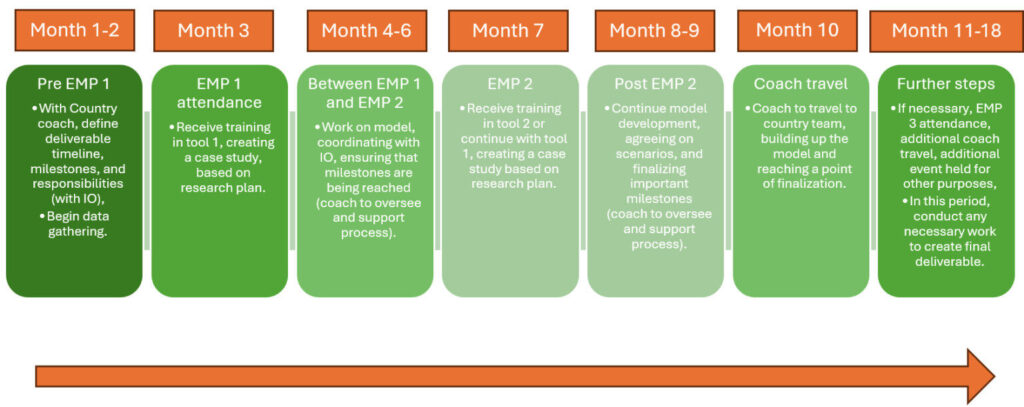
It must be noted that the number and timing of the coach intervention can be changed and must not follow the above diagram. This can be discussed with the International Partnerships team to determine the best time and number of direct Coach interventions.
Apply to the Partners’ Bootcamp
If you would like to engage in the Partners’ Bootcamp, please reach out to Rudolf Yeganyan (r.yeganyan1@lboro.ac.uk).
The initial steps of engaging in the Bootcamp involve a discussion with the CCG International Partnerships team (including elements of costing, co-funding, and otherwise).
Upon verbal agreement with the CCG International Partnerships team, please fill in the following form:
Apply for the Partners’ Bootcamp.
The form serves the purpose of acknowledging undertaking of a Partners’ Bootcamp. It captures essential information that is requested by CCG’s funder, and is utilized purely for evidence gathering.
This form is not binding in any way, and answers provided in the form can change at any point in the engagement of a the Partners’ Bootcamp.
Data-to-Deal Bootcamp (D2D-BC)
Aimed primarily at affiliate countries, with intervention from International Organisations being an option.
The D2D Bootcamp is for affiliate countries (countries which are not direct partner countries to CCG) who wish to implement the D2D framework. It is an intensive, methodological engagement, which is envisioned to be 12-24 months long, with the aim of unlocking concessionary financing at the end of it (or producing the necessary material to support the unlocking of concessionary financing). This Bootcamp can have an additional engagement with an international organisation or other organisation, which supports the implementation of the D2D framework.
The description below is a simple illustration of how the D2D Bootcamp engagement can work. However, to find out full details, please contact r.yeganyan1@lboro.ac.uk.
The D2D Bootcamp supports the implementation of the D2D framework in the following manner:
- Assigning the affiliate country team with a coach, who works with the team in managing the capacity building, guiding analysis and modelling for the final deliverables of the D2D framework, and supporting the team in transferring analysis to a written document
- Having the affiliate country team participate in two EMP events or more; this depends on the number of tools that are required (determined between country, CCG, and IO (if applicable)
- Have the coach travel to the affiliate country team to support modelling, deliverable development and other elements
- Provide any other capacity-building or deliverable support, as deemed necessary for the completion of the D2D framework.
The diagram below displays potential intervention areas of CCG in the completion of the D2D framework.
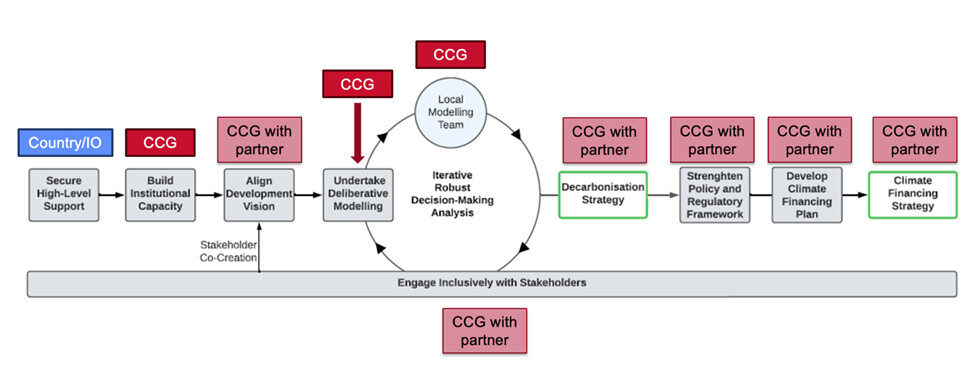
Apply to the D2D Bootcamp
If you would like to complete the D2D framework implementation using the D2D Bootcamp, please contact r.yeganyan1@lboro.ac.uk.
The process of application is based purely on verbal agreements, which can then be formalised via a contract, memorandum of understanding or otherwise.
If you need a leaflet on this, to share with your manager or team, you can find it here.
FlatPack Bootcamp (FBC)
Aimed at academics wishing to integrate CCG’s tools into higher education courses.
The FlatPack Bootcamp is a 6-month journey that begins with hands-on training in one of CCG’s energy or financial modelling tools. After the initial training, academics receive continued support from CCG experts to help them adapt and enrich their existing courses. The goal is to successfully embed one or more CCG tools into the curriculum of a BSc, MSc, or PhD programme.
Individuals and groups are encouraged to apply.
The tools available are:
- OSeMOSYS
- MAED
- CLEWs
- OnSSET
- FINPLAN
FlatPack Bootcamp supports the integration of these tools by:
- Training the individual how to use the tool at an EMP
- Assigning a CCG expert to guide the participant through the process of designing a curriculum.
- Providing ongoing technical support to troubleshoot issues in the initial months of teaching.
- If implementation meets quality standards, the academic will be allowed to apply for Catalyst Facility funding which could be used to fund scholarships for students or research sabbaticals.
The following diagram describes the stages and chronological process for completing the FlatPack Bootcamp. Please note that the process timeline might vary according to EMP dates, course dates, and length of course.
| Months 1–2 | Month 3 | Month 4 | Months 5–6+ | ||
|---|---|---|---|---|---|
|
Acceptance
Candidates accepted on to the FlatPack Bootcamp
|
1st EMP
Candidates attend an EMP to gain initial training on a tool
|
Post-EMP
FlatPack Lead continues engagement and helps candidate design a curriculum, support from tool expert
|
Integration
CCG tool integrated into curriculum in year 1
|
Quality Assurance
Quality Assurance process to determine whether candidate has implemented FlatPack to a high degree of quality
|
Catalyst Facility
Following successful Quality Assurance, candidates allowed to apply for the Catalyst Facility
|
| ➔ | ➔ | ➔ | ➔ | ➔ | |
There is no fee to attend. However, competition for space is high, and space is limited. Only very dedicated teams will be selected for the FlatPack Bootcamp. Please use the below link to apply to the FlatPack Bootcamp:
https://loughboro.qualtrics.com/jfe/form/SV_0VArs2MLfncbuSO
To be eligible for FlatPack Bootcamp you must:
- Be a lecturer at a university in a Low- or Middle-Income Country (LMIC)
To apply, you will have to include the following:
- Your personal and professional details
- A letter of motivation written by you describing why you are interested in the FlatPack Bootcamp and how it would benefit your university and students.
- A stamped Letter of Commitment in PDF format from the head of department or higher authority of your university, indicating how the output of FlatPack Bootcamp will benefit the university and that there is interest from the university management in adapting existing curricula to include the specific tool(s).
- A completed version of the FlatPack Information Gathering template, which asks for key details about your proposal – such as the course title, credit value, and the amount of classroom time available for integration. [Template link]
- If you have previously been trained in the tools which you would like to use as part of the FlatPack Bootcamp, you must attach your certificates to verify your training,
- If you have not been previously trained in the tools which you would like to use as part of the FlatPack Bootcamp, you must attach the Open University certificate of all the tools that you intend to use as part of the Bootcamp,
- All candidates are also required to complete the ‘Modelling, policy and political economy’ course available on the Open University website and attach the certificate of completion on the application form.
Applications will not be considered unless all the above information is included.
If you need further information or guidance about this process, please contact r.yeganyan1@lboro.ac.uk.
Meet the CCG Bootcamps Team
